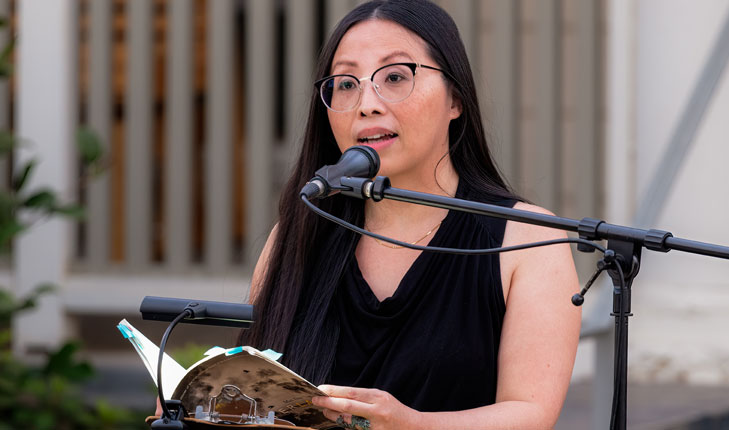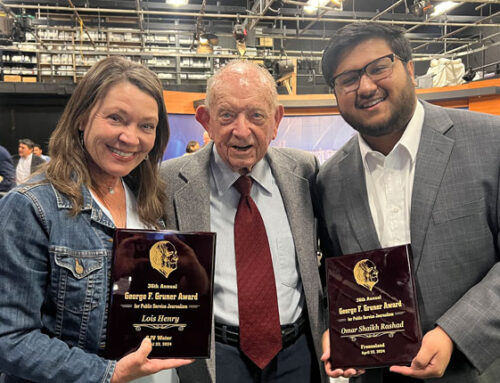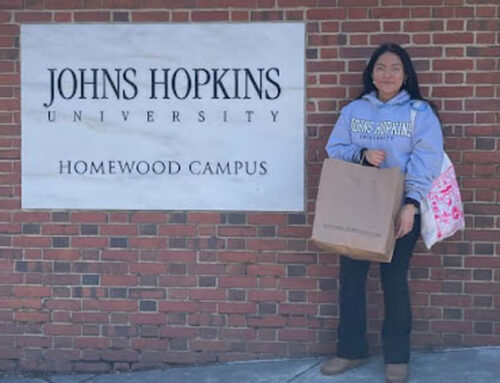Author and Fresno State professor Mai Der Vang was honored April 11 as the recipient of a 2024 Guggenheim Fellowship.
Vang is one of this year’s 188 Guggenheim Fellows – including nine poets – from across North America, chosen from a pool of nearly 3,000 applicants. The fellowships, awarded annually since 1925, are bestowed upon distinguished individuals and culture creators working across disciplines for their “prior career achievement and exceptional promise.”
The fellowship includes a monetary stipend “to pursue independent work at the highest level, under the freest possible conditions.”
Vang, an assistant professor of English who in 2022 was named a Pulitzer Prize finalist for her book of documentary poetry, “Yellow Rain,” joins a small group of canonized Fresno poets to receive the award in the John Simon Guggenheim Memorial Foundation’s 99-year history.
This group includes Fresno State professors emeriti Juan Felipe Herrera, Peter Everwine and Philip Levine, as well as alumni Kathy Fagan, Lawson Fusao Inada, Larry Levis and David St. John.
Fresno State President Saúl Jiménez-Sandoval said he is thrilled for this “impressive recognition” for Vang, and that she represents a voice for the San Joaquin Valley that is fundamental to the region’s future.
“Most importantly, Professor Vang represents the powerful use of collective memory – both personal and historical – to learn, grow and envision a more informed society,” Jiménez-Sandoval said. “Her poetic voice comes out charging, unapologetic and, in doing so, she teaches our Valley the essential importance of carving out one’s space.”
Vang’s poetry – which she sometimes crafts into collage and avant-garde visual compositions – often includes extensive research. Most people, when thinking about research, might visualize faculty inside science labs or outside in vast agricultural fields. But for a poet, research looks much different.
“Research for me, when I’m writing a poem, can be as simple as looking up the name of a tree, or as complex as reading through thousands of pages of archival materials, as I did for ‘Yellow Rain,’” Vang said. “Every poem is different, and some poems will require more intensive research, while other poems can have a way of being just as they are.”
For “Yellow Rain,” Vang integrated archival research and declassified government documents to examine the biological warfare that threads through wars involving Hmong people. The poems in the book acknowledge those who perished and the trauma of those who survived.
Vang can spend hours combing through books, documents and archival materials on a subject to learn and see what inspires or unsettles her. She said discoveries can include anything from a word or phrase to an entire document, or even something visual in the piece. She then takes everything she has underlined, highlighted or tabbed with sticky notes, and assembles it into a single document that she prints out and spreads across a table.
The next stage of analysis, Vang said, is what she has found to be the most interesting and focused part of her research process:
“This is when I’m able to question what anything might mean and how I might translate that ‘meaning’ into poetry,” Vang said. “I never know what I am looking for, which is why the surprise of what I might find becomes that much more profound. I pay attention to ideas that are in conversation or in contradiction, repetitions in the discourse or moments of conceptual departure. From there, I draw what conclusions I can and then transition to poetry.”
Vang said she tries in her poetry to both write toward and away from the research, to reconcile with and against it.
“The outcomes of research to fuel creative work has become vital to my process, as it allows me to examine interdisciplinary connections,” she said. “My writing is further enriched when I can reach outside of my discipline and learn from other fields of study such as history, science and medicine.”
Vang’s forthcoming third book of poetry, “Primordial,” will be published by Graywolf Press in spring 2025. The book is about a critically endangered animal called the saola, whose home is in the Annamite Mountains between Laos and Vietnam.
Vang said the saola looks like an antelope with its two long horns, but it’s actually a relative of wild cattle. It was only recently known to the rest of the world in 1992, and the last camera trap sighting of a saola was in 2013.
“With a remaining population estimated to be fewer than a hundred, the saola has inspired me to write poems examining themes of extinction and origin in conversation with my Hmong cultural identity and history of war,” Vang said. “Through poetry, I try to explore how the defaunation of an ecological space against a backdrop of war, displacement and genocide contributes to and complicates the larger discourse on climate.”
Among the questions Vang attempts to answer in the new book: How does one reconcile and address the geo-trauma of a ravaged war-torn homeland that no longer exists as it once did, but only in memories inherited from elders? How does this war-torn landscape serve as a sanctuary and refuge for the endangered saola?
“The saola has stuck with me since my first book, and I’ve long thought about how I might write poems to honor and mourn the strange and deep affinity I feel with this animal,” Vang said. “Many pieces in the collection draw from research I conducted on the saola, and I’m hopeful there’s something for every reader in these poems.”
Vang said she’s proud to be a writer from Fresno, rooted in a community where poetry runs deep and across generations. She hopes the visibility of her latest recognition might help attract additional funding and resources to help build a more sustainable literary culture in Fresno’s writing community.
“The Guggenheim Fellowship is a reminder for me of the vast potential of what can be achieved because of how much of a want and need there is, especially for someone like me who comes from a place like Fresno,” she said, “where there continues to be a need to nurture creativity and the arts.”
Related Links:
- Author website
- Mai Der Vang talks about “Yellow Rain” with arts journalist Donald Munro
- Mai Der Vang reads at the Woodward Park Library
- Read poems by Mai Der Vang on Poets.org and in Poetry Magazine
(Photo by Larry Cusick)



